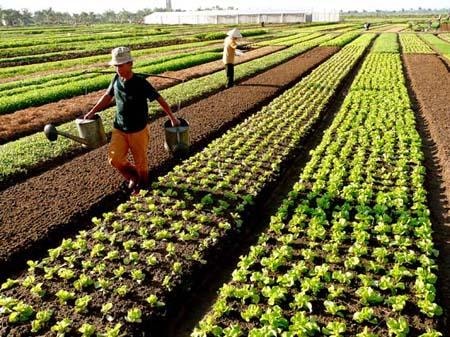Strengthening safe vegetable production capacity
In order to help Vietnam gradually improve its capacity in food safety and hygiene, and at the same time achieve criteria and technical requirements in accordance with international requirements in the context of Vietnam's accession to the WTO, in 2010, the WTO entrusted the FAO (Food and Agriculture Organization of the United Nations) to support the Vietnamese Government through the SPS Project.
The project was built with the goal of enhancing capacity for food safety and quarantine of animals and plants, and at the same time managing the quality of agricultural products at all stages from production, preservation, distribution to product marketing, helping farmers grasp trade opportunities... through a value chain production approach.
 |
| Illustration |
Phase I of the SPS project was managed and implemented by the Fruit and Vegetable Research Institute, from 2010 to the end of 2012, with specific tasks such as: Drafting and disseminating documents, and training farmers on technical measures on VietGAP good agricultural practices in project implementation areas; building safe vegetable production models, and supporting and guiding farmers participating in the project to access vegetable quality management and food safety models with the value chain of 6 vegetable varieties; organizing activities to strengthen the link between production organizations and domestic and foreign consumption markets...
Specifically, in the 3 years of implementing phase I, the project has established 6 value chains for vegetable varieties including tomatoes, chayote, cabbage, cherry tomatoes, and baby cucumbers in 3 provinces: Son La, Hung Yen and Lam Dong.
Along with the drafting of publications and documents guiding vegetable production according to VietGAP, the project organized 2 training courses with dozens of training classes for officials of the Department of Agriculture and Rural Development, employees of processing companies, traders and technical staff of cooperatives participating in the project in 3 provinces with a total of more than 850 people. Field workshops, with the participation of many managers, scientists, farmers, traders and processing enterprises, were also organized, creating a synchronous connection from production to consumption.
At the project sites, 6 VietGAP certificates have also been granted by the functional units of the Ministry of Agriculture and Rural Development. Thanks to that, vegetable products in the project areas have been accepted by many supermarkets in Vietnam. Baby cucumbers and cherry tomatoes are also exported to Ukraine and France.
In December 2011, the project organized delegations to visit and study the safe vegetable production model in China, and organized many meetings between domestic production and consumption partners to introduce the potential of safe vegetable supply in Moc Chau (Son La), Da Lat (Lam Dong), Hung Yen, thereby finding markets as well as creating close links from production to consumption.
In addition to initial successes, phase I of the project still faced many limitations such as inappropriate learning materials for farmers; the project's vegetable production models were small and limited in quantity; the process of granting certificates for safe vegetable production was difficult and complicated; the linkage of the production chain to consumption and traceability of product origin had not been properly implemented...
To overcome these limitations, Phase II of the project (2013 - 2016) will focus on expanding and replicating the results of Phase I. Specifically, the project's goal will be to continue to provide in-depth training for local producers, processors and traders on safe vegetable production and consumption; promote the consumption market by establishing 6 demonstration models in 4 seasons for selected vegetable varieties; promote the market linkage between production and consumption...
To achieve these goals, Phase II of the project will expand the demonstration model, add training courses on safe vegetable production, simplify the VietGAP certification process, build brands - connect markets, and promote traceability through product packaging...
According to NNVN






